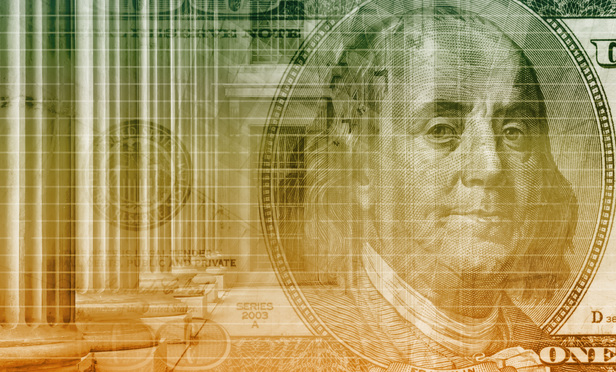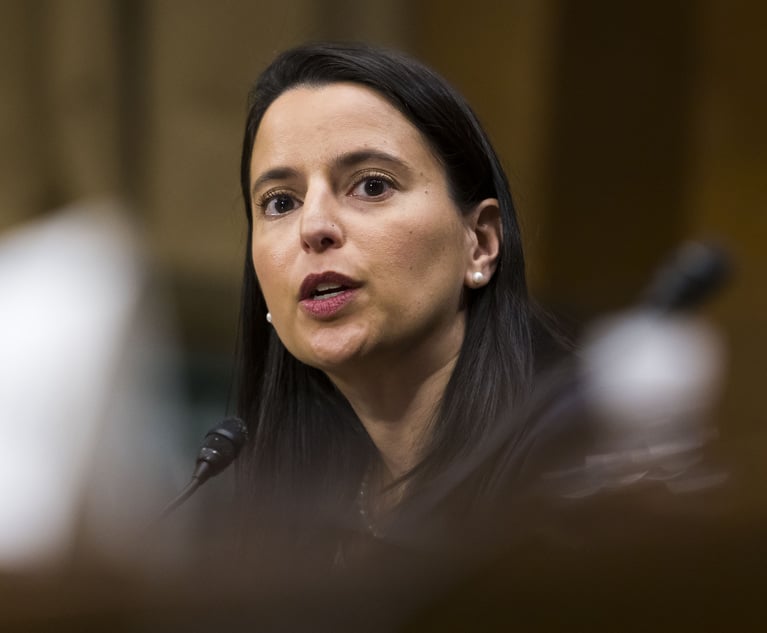High-Salaried Lawyers Should Pay More in Dues Than Others: Lawmaker
The California Legislature has not increased licensees' fees, previously called dues, since 1998 despite bar leaders' regular pleas for more money.
April 08, 2019 at 06:46 PM
4 minute read
 Photo: Bigstock
Photo: Bigstock
A key state lawmaker says his colleagues should use their authority over the annual bar dues bill to “restructure” the fee schedule so high-salaried attorneys pay more than their lower-earning counterparts in the profession.
Assemblyman Mark Stone, D-Scotts Valley, told members of the Judiciary Committee, which he chairs, that bar leaders' pending request to the Legislature for a $100 annual fee hike—plus $330 in one-time assessments in 2020—is “our opportunity to take some of the regressive nature of that fee structure out.”
“That's where we could have the biggest effect on attorneys who are at the low end of the wage scale because not all attorneys are making as much money,” Stone said at a recent committee hearing. “And especially those attorneys where those firms are very large and expensive, and the firms pay for the fees anyway, I think there should be a lack of sympathy to the burden that that provides.”
Stone's comments came during a hearing on legislation that would make mandatory a now-optional $40 fee on lawyers' dues bills that funds legal aid programs. The committee advanced the legislation but not without a debate over the fairness of making all lawyers pay the same amount.
Forty dollars “represents about six minutes of work for the average big-firm attorney,” said Assemblyman David Chiu, D-San Francisco, a former attorney at the Lawyers' Committee for Civil Rights.
“The reality is, 90 percent of all attorneys work for the top 10 percent of America, which means that 10 percent of all attorneys represents everyone else,” Chiu continued. “And that's just not a situation that is tenable.”
In endorsing a $100 fee increase last month, state bar trustees directed staff to work on a scaling mechanism that would lower dues bills for attorneys who earn less, either based on their salaries or their household incomes. The bar's executive director, Leah Wilson, noted, however, that any discount for some lawyers would trigger higher charges for others to maintain the same revenue stream for the agency.
This year's fees bill, in its current form, calls for a dues charge of an “unspecified amount” plus a 25 percent discount for active licensees with gross individual incomes of less than $60,478. Today, only lawyers with gross incomes of less than $40,000—just under 14,500 licensees fell into that category, according to a 2017 bar survey—qualify for a free break.
The Legislature has not increased licensees' fees, previously called dues, since 1998 despite bar leaders' regular pleas for more money to cover increasing labor costs and disciplinary workload.
In 2016, a dispute between the Assembly and the Senate—with the Assembly pushing for immediate changes to the bar's structure and practices—led to the Legislature failing to enact an annual fee authorization bill. The California Supreme Court authorized the bar to collect dues on an interim basis, and the full Legislature endorsed a new fee bill that included structural reforms to the agency in 2017.
“I know there's been a lot of pushback in this committee to this notion of increasing dues anyway,” Stone said at the Judiciary Committee hearing. “So it's our opportunity to restructure it. With that, I'm going to need your help … and I'm hoping we can come up with an approach that all of us can stand together. We've made some significant changes in the bar over the last couple of years by standing together.”
This year's fees bill is scheduled to be heard in the Senate Judiciary Committee on April 30. The state auditor is also expected to release a report on the agency's operations that day. Bar trustees will meet in closed session Tuesday to review a draft copy of that report.
The dues bill author, Sen. Hannah-Beth Jackson, D-Santa Barbara, has said whether the bar gets the dues increase its seeking will depend in part on what that audit and an upcoming report from the legislative analyst's office say.
Read more:
California Bar, Seeking $100 Dues Increase, Warns of Service Cuts
This content has been archived. It is available through our partners, LexisNexis® and Bloomberg Law.
To view this content, please continue to their sites.
Not a Lexis Subscriber?
Subscribe Now
Not a Bloomberg Law Subscriber?
Subscribe Now
NOT FOR REPRINT
© 2025 ALM Global, LLC, All Rights Reserved. Request academic re-use from www.copyright.com. All other uses, submit a request to [email protected]. For more information visit Asset & Logo Licensing.
You Might Like
View All
Chicago Law Requiring Women, Minority Ownership Stake in Casinos Is Unconstitutional, New Suit Claims
5 minute read

Fresh lawsuit hits Oregon city at the heart of Supreme Court ruling on homeless encampments
4 minute readTrending Stories
- 1Public Notices/Calendars
- 2Wednesday Newspaper
- 3Decision of the Day: Qui Tam Relators Do Not Plausibly Claim Firm Avoided Tax Obligations Through Visa Applications, Circuit Finds
- 4Judicial Ethics Opinion 24-116
- 5Big Law Firms Sheppard Mullin, Morgan Lewis and Baker Botts Add Partners in Houston
Who Got The Work
J. Brugh Lower of Gibbons has entered an appearance for industrial equipment supplier Devco Corporation in a pending trademark infringement lawsuit. The suit, accusing the defendant of selling knock-off Graco products, was filed Dec. 18 in New Jersey District Court by Rivkin Radler on behalf of Graco Inc. and Graco Minnesota. The case, assigned to U.S. District Judge Zahid N. Quraishi, is 3:24-cv-11294, Graco Inc. et al v. Devco Corporation.
Who Got The Work
Rebecca Maller-Stein and Kent A. Yalowitz of Arnold & Porter Kaye Scholer have entered their appearances for Hanaco Venture Capital and its executives, Lior Prosor and David Frankel, in a pending securities lawsuit. The action, filed on Dec. 24 in New York Southern District Court by Zell, Aron & Co. on behalf of Goldeneye Advisors, accuses the defendants of negligently and fraudulently managing the plaintiff's $1 million investment. The case, assigned to U.S. District Judge Vernon S. Broderick, is 1:24-cv-09918, Goldeneye Advisors, LLC v. Hanaco Venture Capital, Ltd. et al.
Who Got The Work
Attorneys from A&O Shearman has stepped in as defense counsel for Toronto-Dominion Bank and other defendants in a pending securities class action. The suit, filed Dec. 11 in New York Southern District Court by Bleichmar Fonti & Auld, accuses the defendants of concealing the bank's 'pervasive' deficiencies in regards to its compliance with the Bank Secrecy Act and the quality of its anti-money laundering controls. The case, assigned to U.S. District Judge Arun Subramanian, is 1:24-cv-09445, Gonzalez v. The Toronto-Dominion Bank et al.
Who Got The Work
Crown Castle International, a Pennsylvania company providing shared communications infrastructure, has turned to Luke D. Wolf of Gordon Rees Scully Mansukhani to fend off a pending breach-of-contract lawsuit. The court action, filed Nov. 25 in Michigan Eastern District Court by Hooper Hathaway PC on behalf of The Town Residences LLC, accuses Crown Castle of failing to transfer approximately $30,000 in utility payments from T-Mobile in breach of a roof-top lease and assignment agreement. The case, assigned to U.S. District Judge Susan K. Declercq, is 2:24-cv-13131, The Town Residences LLC v. T-Mobile US, Inc. et al.
Who Got The Work
Wilfred P. Coronato and Daniel M. Schwartz of McCarter & English have stepped in as defense counsel to Electrolux Home Products Inc. in a pending product liability lawsuit. The court action, filed Nov. 26 in New York Eastern District Court by Poulos Lopiccolo PC and Nagel Rice LLP on behalf of David Stern, alleges that the defendant's refrigerators’ drawers and shelving repeatedly break and fall apart within months after purchase. The case, assigned to U.S. District Judge Joan M. Azrack, is 2:24-cv-08204, Stern v. Electrolux Home Products, Inc.
Featured Firms
Law Offices of Gary Martin Hays & Associates, P.C.
(470) 294-1674
Law Offices of Mark E. Salomone
(857) 444-6468
Smith & Hassler
(713) 739-1250







